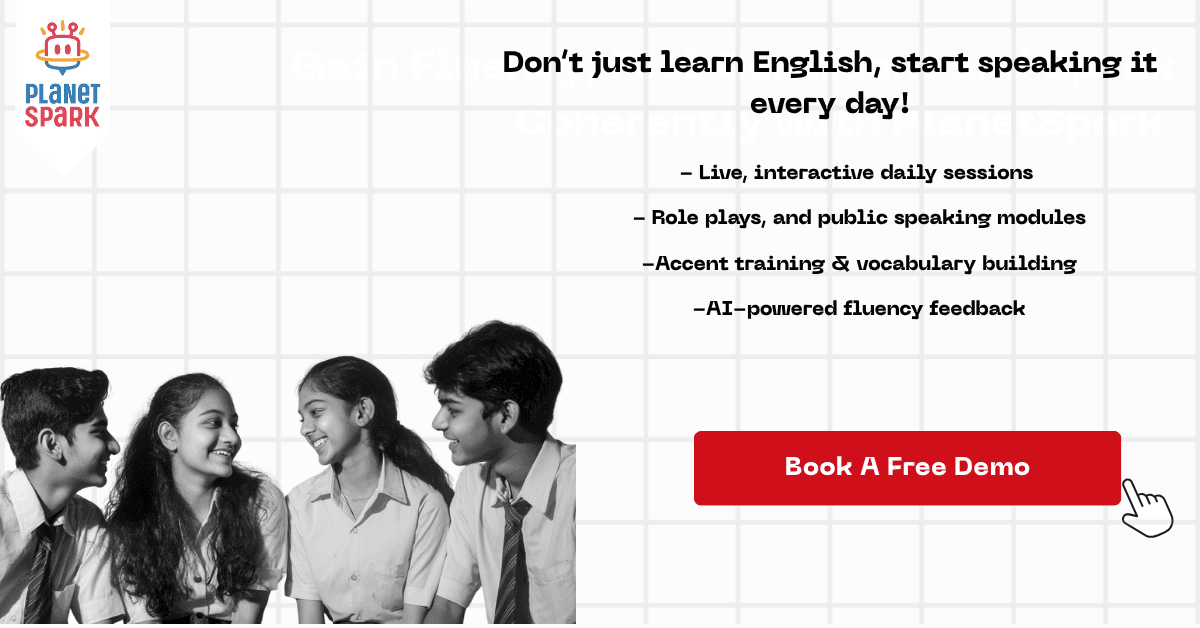English Talking Practice: A Guide to Speak Fluently
Last Updated At: 10 Jul 2025
7 min read

In a world connected by language, English talking practice has become a necessity. From school classrooms to international workplaces, English is the bridge that enables communication, collaboration, and confidence. That’s where targeted, consistent English speaking practice comes in.
This blog is your one-stop resource to learn how to speak English, improve fluency, and unlock confidence.
How to Practice Speaking English Effectively
The methods below help learners think in English, speak fluently, and gain confidence, whether they’re just beginning or aiming for greater clarity and articulation.
Here are some highly effective techniques you can start using today to improve your english speak skills fluently:
Mirror Practice: One of the simplest and most powerful tools for practicing spoken English is a mirror. Standing in front of a mirror and talking to yourself helps build self-awareness and speaking confidence.
- Describe your day, your goals, or what you see in the room all in English.
- Pretend you’re giving a speech or having a conversation.
- Focus on facial expressions, mouth movement, and body language.
Record Your Voice: Use your phone or computer to record yourself speaking on different topics. Then, listen to the recording critically.
- Observe your pronunciation, pace, intonation, and sentence structure.
- Notice common errors maybe you’re repeating filler words like “uh,” or mispronouncing certain words.
- Repeat the activity to track your improvement over time.
Talk with a Partner: Nothing improves fluency like real conversations. Find a speaking partner who’s also interested in learning English or is already fluent.
- Set aside at least 15–30 minutes daily for English-only conversations.
- Talk about topics you enjoy: favorite books, school life, weekend plans, or even global news.
- Correct each other gently, and keep the sessions encouraging and fun.
Use Prompts and Role Plays: Role-playing is a fun and interactive way to make English speaking practice feel like real life.
- Pick practical scenarios: ordering at a restaurant, attending a job interview, or introducing yourself to a group.
- Create dialogues and act them out with a partner or even alone.
- Use voice modulation, appropriate expressions, and gestures.
Watch and Repeat: Learn from the best! Watch English TV shows, movies, or YouTube channels that feature clear, natural conversation.
- Choose short clips with subtitles. Watch first, then repeat lines aloud.
- Try to match the speaker’s tone, speed, and pronunciation as closely as possible.
- Pause, rewind, and repeat until you feel confident
Join an English Speaking Course: While self-practice is important, structured guidance can accelerate learning and ensure consistent growth. That’s where English Speaking Course comes in. Enrolling in a course ensures that learners don’t just practice, but practice with purpose guided by experts, structured modules, and meaningful feedback.
Looking for ways to build your or your child’s confidence in English? The key is consistent, purposeful speaking practice but not just any practice. PlanetSpark's Spoken English course helps children and young learners become fluent, articulate speakers using proven methods.

How to Speak English Fluently: Key Skills to Build
Fluency is more than just speed. It’s about comfort, confidence, and coherence. Here’s how to develop fluency in a practical way:
Think in English: Stop translating. Instead, form thoughts directly in English.
Use Common Phrases: Learn sentence starters, greetings, and transitions.
Pause, Don’t Panic: It’s okay to pause while thinking. Don’t rush.
Speak Slowly & Clearly: Clarity matters more than speed.
Expand Your Vocabulary: Learn new words and use them during conversation.
Fluency is a habit. The more you engage in English talking practice, the more naturally you’ll speak English.
English Talking Practice for Kids: Special Focus
Children are especially receptive to learning languages early. PlanetSpark leverages this by:
Creating a fun, gamified environment
Integrating storytelling and debating to build expressiveness
Encouraging creative thinking through speaking tasks
Hosting speech competitions and group discussions
This not only improves English speaking but also supports overall personality development.
Why English Talking Practice is Essential
Here’s why it’s crucial for anyone especially children to include spoken English practice in their daily routine:
Breaks the Fear of Speaking
Many learners both children and adults feel nervous when they try to speak English, often due to fear of making mistakes or being judged. This fear can prevent them from even starting a conversation. Consistent talking practice is the best way to reduce this anxiety. As children speak more, they realize that mistakes are just part of the learning process. Over time, their confidence builds, and speaking English starts to feel natural rather than stressful.
Improves Fluency and Clarity
Fluency isn’t just about speaking quickly it’s about speaking smoothly and clearly without long pauses or filler words like “uh” or “umm.” When learners practice talking regularly, their thoughts begin to flow faster into words. This practice reduces the time it takes to form sentences and helps improve pronunciation, tone, and sentence rhythm.
Boosts Communication Skills
Understanding grammar rules is only the beginning. The real test is being able to apply those rules while speaking to someone in real-time. English talking practice helps children learn how to express themselves clearly and effectively. They also learn how to use tone, body language, and expressions to communicate meaning. These are essential life skills that go beyond the classroom.
Enhances Vocabulary and Usage
Reading introduces new words, but talking is what makes those words stick. When kids speak regularly, they naturally begin using new vocabulary in context. This not only improves their word bank but also teaches them the correct way to use words, idioms, and phrases. Repeated use in conversation helps them remember and refine their language.
Builds Listening and Responding Skills
Good speaking practice isn’t just about talking, it’s also about listening. In real conversations, learners must process what the other person is saying and then respond appropriately. This strengthens their comprehension, focus, and reaction time. Children who engage in regular dialogues learn how to stay attentive, interpret tone and meaning, and give thoughtful responses.
Watch confidence grow with every conversation.
Book a free demo class with PlanetSpark today and experience the power of effective English talking practice!
How PlanetSpark Builds Fluent, Confident English Speakers
PlanetSpark offers one of the most comprehensive and engaging platforms for spoken English development. Here’s how it supports learners:
Daily Live Conversations: Students interact with certified teachers in live, interactive English sessions designed around real-life situations home, school, travel, and more.
Accent Neutralization: Special training modules focus on pronunciation, phonetics, and reducing mother tongue influence crucial for global English.
Role Plays & Dialogues: Kids participate in structured role plays like ordering food, answering questions, or giving a formal speech in English.
AI Feedback & Instant Correction: PlanetSpark uses cutting-edge tools to provide AI Fluency Reports and trainer feedback for each speaking session.
Personalized Speaking Practice: 1-on-1 classes mean every child gets individualized attention and a tailored roadmap to fluency.
Confidence Trackers: Parents receive detailed reports on how their child is progressing across vocabulary, fluency, grammar, and communication skills.

Conclusion
The journey to confident English communication begins with one simple action: speak. And then speak again, and again. Daily, focused English talking practice is the key to mastering the language and overcoming hesitation.
With expert-led programs, live classes, and AI-supported feedback, PlanetSpark empowers learners to transform their spoken English skills from hesitant to articulate, from average to outstanding.
Frequently Asked Questions
Q. What is the best way to practice English conversation at home?
A. Mirror speaking, role plays, reading aloud, and joining a structured course like PlanetSpark are great ways to start.
Q. Can PlanetSpark help my child speak English fluently?
A. Yes, PlanetSpark provides daily spoken English practice, feedback, and structured learning aligned to every child’s level.
Q. What makes PlanetSpark’s English speaking course different?
A. It combines live conversation, certified trainers, AI reports, and interactive tools to make learning immersive and effective.
Q. Is English talking practice only for beginners?
A. Not at all. Even advanced speakers benefit from regular speaking practice to refine fluency, pronunciation, and vocabulary.
Q. What are the benefits of joining PlanetSpark’s English Speaking Course?
A. Here’s a quick comparison that shows how PlanetSpark goes beyond traditional learning:
Feature | PlanetSpark’s Advantage |
Live Sessions | Real-time interaction and conversation |
Personal Coaching | 1:1 sessions with trained experts |
Pronunciation Training | Phonetics + accent reduction |
Structured Curriculum | Vocabulary, grammar, confidence building |
Instant Feedback | AI-powered fluency reports |
Interactive Practice | Games, role plays, and storytelling |
Personalized Communication Report
Record a video to get a AI generated personalized communication report for your child
Select Learner's Class

Hi There, want to try these
tips for your child with
LIVE with our expert coach?
Let's check your child's
English fluency
